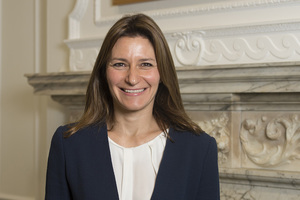Improvements to care for pregnant women and mothers in prison
Individual care plans and increased staff training on supporting vulnerable mothers and pregnant women will significantly improve the way they are cared for in custody, under a new policy published today (Friday 31 July).

- Every female prison to have resident mother and baby specialist
- Extra training for staff on looking after pregnant prisoners
- New advisory group to ensure support for such women
The reforms follow a review of Mother and Baby Units (MBUs) – specialist centres where female prisoners can live with children up to 18 months old receiving dedicated care.
The support currently available to women on MBUs will now be formally extended to pregnant prisoners and those separated from young children. As a result, more staff in female prisons will receive training on how to help women in these situations and all women’s prisons will have a resident pregnancy and mother specialist, ensuring those who need extra care can get it.
More than 60% of women in custody have experienced domestic abuse and around half have a history of substance misuse. Compared to men, women in prison are much more likely to be primary carers with almost 50% of them having children in the community. The Government’s flagship Female Offender Strategy set out a plan two years ago to see fewer women, particularly those with children, sent to prison and instead receiving robust community sentences, where appropriate, and which would allow them to get treatment to overcome the problems driving their criminality.
Nevertheless, when a woman’s offence demands a custodial sentence, including those who are pregnant or have young children, MBUs provide a safe and nurturing environment for babies and crucial, dedicated support to their vulnerable mothers. These units are supported by specially trained prison officers and nursery nurses and allow mother and child to stay together and properly bond at what is a crucial stage in the child’s development.
Lucy Frazer QC MP, Minister for Prisons and Probation said:
Pregnant women and those in prison with young children often come from complex backgrounds and with specific needs, which is why it is vital we provide them with the best possible support.
Staff on Mother and Baby Units do an incredible job but we also need that tailored care for women in prison who are pregnant or separated from their young children.
The changes we plan to make will help to ensure children get a good start in life, looked after by a mum better able to turn her own life around thanks to the support of prison and probation staff.
Healthcare in women’s prisons is commissioned by NHS England and NHS Improvement and following the development and roll out of their Perinatal and Mental Health Care Pathways, pregnant women and mothers in custody will benefit from a nationally coordinated approach for the first time. This will allow the consistency in care received before, during and after a pregnant women’s time in custody. It also ensures support for all health needs, including treatment for substance misuse, mental health support and maternity services. This joined up approach offers a more holistic care plan that has been proven to benefit both mother and child.
This new, additional care will be extended across the estate and not just apply to those on MBUs, meaning greater support for all women experiencing separation from young children or the loss of a baby. The resident pregnancy and mother specialist role has also been updated to reflect this and ensure it acts as a single point of contact for all women, their families and staff working with them.
A former MBU resident said:
I have nothing but positives to say about MBUs at New Hall and Askham Grange. The prison and nursery staff supported me 100% on everything.
They gave me the opportunity to keep and know my children, and I became a better person and parent with their help and guidance. Without these units my children wouldn’t have known who I was, the bond we have is unbroken all thanks to these amazing people.
The number of pregnant women in custody and births in prison will also be collected centrally and published for the first time. While this information has been known at a prison-level, collecting the data centrally will help the Prison Service to map out the scale of support needed and how this informs provisions such as MBUs, including their size and where they are located.
A new committee, including current and former prisoners, is also being established to ensure that implementation of these reforms can be monitored and learnt from, with any further areas for improvement identified at the earliest opportunity.
During the course of the review, one baby has died in prison while another was sadly stillborn. Both are tragic events and are being interpedently investigated as appropriate, including by the Prisons and Probation Ombudsman. Immediate changes have already been made, including extra welfare checks for prisoners in the late stages of pregnancy. We will respond to any lessons learnt from the investigations.